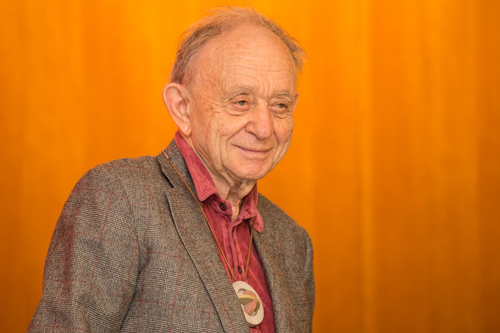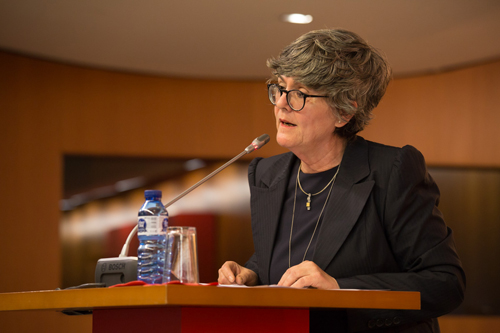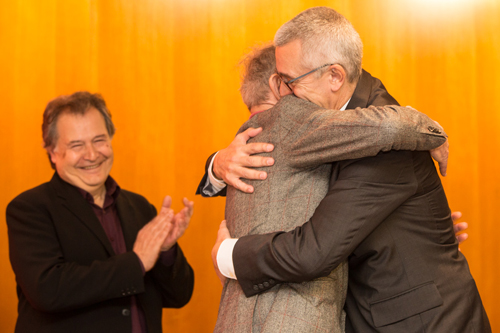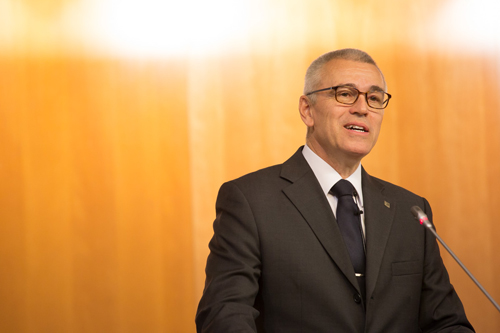Documentary filmmaker Frederick Wiseman made doctor honoris causa by UPF
Documentary filmmaker Frederick Wiseman made doctor honoris causa by UPF
- Open ceremony
- Laudatio speech given by Mercè Ibarz
- Investiture of Frederick Wiseman and his acceptance speech
- On Wiseman documentary
- Closing speech by Jaume Casals
- Image gallery
- Video of de ceremony

The American filmmaker, Frederick Wiseman, considered one of the most prestigious documentarians in the history of filmmaking, was made doctor honoris causa by UPF during a ceremony held yesterday, 3 May, at noon in the auditorium of the University’s Ciutadella campus.
The event was presided over by the UPF rector, Jaume Casals, who was accompanied at the presidential table by Núria Basi, chair of the Board of Trustees; Pelegrí Viader, general secretary of the University, and José Fernández Cavia, director of the Department of Communication.
After the entrance of the academic authorities to the sound of the traditional Irish piece An Irish Blessing, performed by the UPF choir, Jaume Casals gave the opening speech throughout which the filmmaker was accompanied by his promoter, Jordi Balló, professor of the Department of Communication.
Pelegrí Viader read out the agreement of the Board of Governors (session of 17 February), at the proposal of the Department of Communication, to award him with the doctor honoris causa. The agreement acknowledges Wiseman’s bold career, a reference in film studies, and a body of work that has helped to increase cinematographic and sociological knowledge through great commitment to progress and to the institutions that govern our society.
Frederick Wiseman, together with Jordi Balló, entered the auditorium to a standing ovation. Mercè Ibarz, professor of the Department of Communication, then read his laudatio.
Laudatio speech given by Mercè Ibarz
> Laudatio speech (pdf document)

In her speech, Mercè Ibarz reviewed the filmmaker’s career and work, defining him as “a dramatist of public life”. “Wiseman is a documentarian of our fears and our hopes, often lost but always alive, of the beauty that inhabits life together despite everything that fails at the roots”, she said.
Mercè Ibarz reflected on Wiseman’s marked social character and his role as a narrator of our time: “Over the course of half a century of cinema and 44 films so far, Wiseman, observing critically, with provocative irony, compassion and pedagogical distancing, has become a unique filmmaker as well as an anthropologist, a historian and a social analyst of the institutions and of the laws of the second half of the 20th and the early 21st centuries”.
The lecturer of the Department of Communication mentioned the features of the filmmaker’s work and their importance in the world of film: “His film is a form of accompaniment of petty lives. Lives that are often stifled by ignorance and impotence, which Wiseman sounds out, and listens to, in a neat exercise of visual democracy and intelligence, when he picks the topic and when he films it”.
At the end of her speech, Mercè Ibarz recalled Wiseman’s presence at UPF in his seminars for the first edition in 1998 of the master’s degree in Creative Documentary, and in 2006 edition, and at a session with students in the Rambla building: “His presence has left a mark on the documentarians who trained there and on the image professionals and lecturers who attended”.
> Video of the laudatio of Frederick Wiseman, given by Mercè Ibarz
Investiture of Frederick Wiseman and his acceptance speech

The most solemn moment of the ceremony was Frederick Wiseman’s investiture, when he received the medal of honoris causa by UPF from the rector Jaume Casals, who gave him a fraternal embrace signalling his becoming a member of the University’s Senate of doctors.
And as a new doctor by UPF, Frederick Wiseman gave his acceptance speech which he began by talking about his time as a teacher of law, when he was already interested in grasping the reality of society, in observing people, and then had the idea of making a film based on an institution like the prison.
The filmmaker went on to speak about his way of making films: “My technique is still the same as in recent years, we are a small team of three people. I don’t like to know things in advance, I act on instinct, and what I try to do is to build up material, and after that, see what happens”. And he added: “For me, technique serves content, not the other way around”.
Continuing with his style, he stated: “when I’m editing a film I always have to think about various options, to analyse what is happening, what the specific needs might be. Then I build the structure”.
And he added: “You have to be ready to film everything that is happening, you need to take risks, record a lot in order to have enough material. It is better to overdo it and have the option of editing. The film comes from the process of analysing the summary of the recordings”.
Frederick Wiseman, who has acknowledged that he is influenced rather by the books he reads than the films he sees, has seen this way of making documentary films as “a great adventure”.
>> Video with Frederick Wiseman’s acceptance speech as doctor honoris causa
Screening of the documentary On Wiseman
In the last part of the ceremony, Jordi Balló presented the documentary On Wiseman, which includes the testimony of fourteen filmmakers, many of whom attended the talk Wiseman gave on the master’s degree in Creative Documentary in 1998, later repeated in 2006.
The film, directed by Ricardo Íscar, is an example of how the American filmmaker has been present in the movement that has taken place in recent decades in Catalonia to revive the documentary, and the mark his work has left, as well as how it has been transmitted to the university environment.
The fourteen filmmakers who chose and commented on a sequence of one of Wiseman’s films are: Luis E. Parés, Javier Rebolllo, Isaki Lacuesta, Elías León Siminiani, Virginia García del Pino, Mercedes Álvarez, José González Morandi, Neus Ballús, Lupe Pérez, Carla Subirana, Xapo Ortega and Xaiver Artigas, Pilar Monsell, Oliver Laxe and Mar Coll.
Closing speech by Jaume Casals

Jaume Casals, in his closing speech, said that he has recently seen several of Wiseman’s films, including At Berkeley (2013), and that he really identifies with what is narrated. The rector made a comparison of what it means to “eat soup” every day with the day-to-day work at the University.
Jaume Casals contrasted the satisfaction and certainty of scientists when carrying out their work with the doubts and ‘metadiscourses’ on the meaning of the university: “In contrast with the optimism of science is the pessimism of other parts of the institution”, he stated.
However, he assured that he does not conform with or accept such pessimism, and that he is in favour of making improvements relating to the university: “I along with those assisting me aim to create chances to turn the mud on the tips of our shoes into dust and adventures”. And he added: “My main goal is for the representatives and heads of the various academic fields to be at the forefront of the University”.
